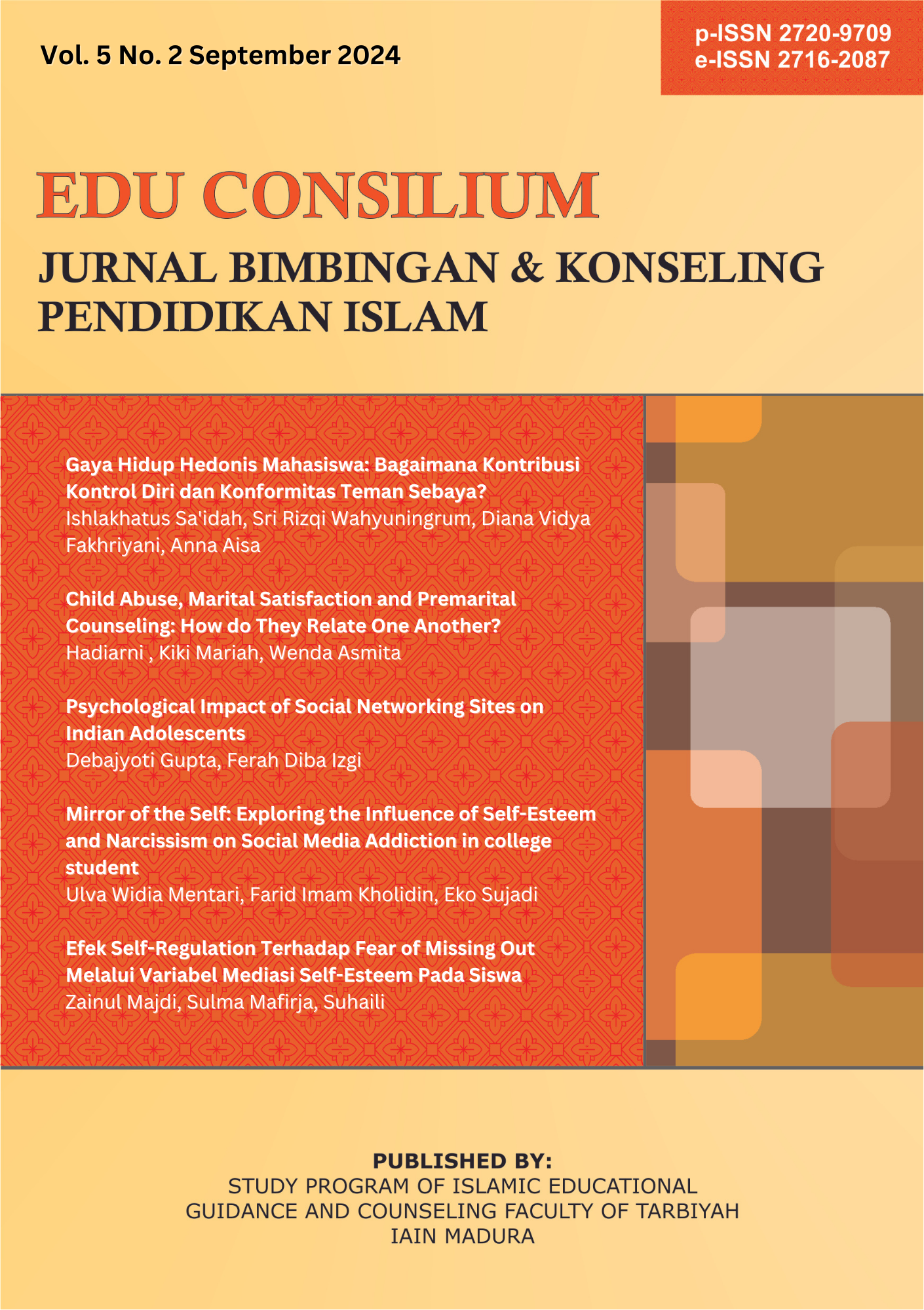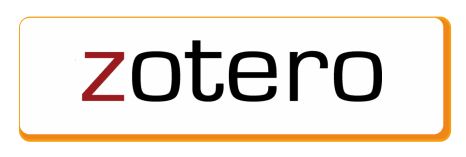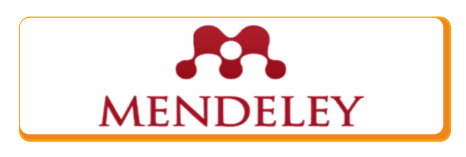Mirror of the Self: Exploring the Influence of Self-Esteem and Narcissism on Social Media Addiction in college student
 Abstract views: 278
,
Abstract views: 278
,
 PDF downloads: 285
PDF downloads: 285
Abstract
Social media addiction is a concerning condition because it will disturb a person's mental health. This study aims to analyze the effect of self-esteem and narcissism on social media addiction. This study uses quantitative research using survey and correlational research designs. The subjects of this study amounted to 65 people and the research data were revealed using the self-esteem scale, narcissistic scale, and social media addiction scale. The results showed that there was a negative correlation
between self-esteem and social media addiction, then statistics also hurt social media addiction.
negative impact on social media addiction. It is recommended that future researchers conduct an in-depth investigation of the complex interactions between narcissism, self-esteem, and social media use. narcissistic, self-esteem, and social media use, and develop more effective strategies to reduce the negative effects of social media addiction. strategies to reduce negative effects.
Downloads
References
Agusta, D. (2016). Faktor-Faktor Resiko Kecanduan Menggunakan Smartphone Pada Siswa di Smk Negeri 1 Kalasan Yogyakarta. E-Journal Bimbingan dan Konseling, 86–96.
Annisa, A. S. A. N., Yuliadi, I., & Nugroho, D. (2020). Hubungan Tingkat Kepercayaan Diri Dengan Intensitas Penggunaan Media Sosial Whatsapp Pada Mahasiswa Kedokteran 2018. WACANA, 12(1), 86–109. https://doi.org/10.13057/wacana.v12i1.170
Aprilia, R., Sriati, A., & Hendrawati, S. (2020). Tingkat Kecanduan Media Sosial pada Remaja. Journal of Nursing Care, 3(1). https://doi.org/10.24198/jnc.v3i1.26928
Bányai, F., Zsila, Á., Király, O., Maraz, A., Elekes, Z., Griffiths, M. D., Andreassen, C. S., & Demetrovics, Z. (2017). Problematic Social Media Use: Results from a Large-Scale Nationally Representative Adolescent Sample. PLOS ONE, 12(1), e0169839.
Bhargava, V. R., & Velasquez, M. (2021). Ethics of the Attention Economy: The Problem of Social Media Addiction. Business Ethics Quarterly, 31(3), 321–359. https://doi.org/DOI: 10.1017/beq.2020.32
Coralia, F., & Qodariah, S. (n.d.). TIPE KEPRIBADIAN DAN SELF-ESTEEM PADA PECANDU MEDIA SOSIAL.
Dalila, F., Putri, A. M., & Harkina, P. (2021). Hubungan Antara Intensitas Penggunaan Media Sosial Instagram dengan Harga Diri. Jurnal Psikologi Malahayati, 3(1). https://doi.org/10.33024/jpm.v3i1.3769
Grau, S., Kleiser, S., & Bright, L. (2019). Exploring social media addiction among student Millennials. Qualitative Market Research: An International Journal, 22(2), 200–216. https://doi.org/10.1108/QMR-02-2017-0058
Hartati, E., Indriyani, R., & Trianingsih, I. (2020). Analisis Kepuasan Pengguna Website SMK Negeri 2 Palembang Menggunakan Regresi Linear Berganda. MATRIK : Jurnal Manajemen, Teknik Informatika dan Rekayasa Komputer, 20(1), 47–58. https://doi.org/10.30812/matrik.v20i1.736
Hendrata, N. D., & Christianto, L. P. (n.d.). Keterkaitan Minat Selfie Dengan Kepribadian Narsistik dan Harga Diri Pada Remaja. 231–237.
Islamy, I. (n.d.). PENELITIAN SURVEI DALAM PEMBELAJARAN DAN PENGAJARAN BAHASA INGGRIS.
Jani, S., & Weismann, I. T. (2021). Pengaruh Kecanduan Media Sosial Terhadap Prestasi Belajar Mahasiswi Asrama Di Sekolah Tinggi Filsafat Jaffray Makassar [Preprint]. Open Science Framework. https://doi.org/10.31219/osf.io/rwy6a
Putri, Z. Y., Juliawati, D., & Yandri, H. (2021). Self-Esteem dan Motivasi Altruistik Siswa yang Mengikuti Kegiatan Pramuka di Sekolah. Indonesian Journal of Counseling and Development, 3(1), 51–58. https://doi.org/10.32939/ijcd.v3i1.924
Saaduddin, S., Sujadi, E., Sasferi, N., & Jumiarti, D. (2023). The Effect of Self-Esteem on Resilience among Victims of Bullying: Does Gender Play a Role? Educational Guidance and Counseling Development Journal, 6(1), 1. https://doi.org/10.24014/egcdj.v6i1.22025
Sakinah, U., Zatrahadi, M. F., & Darmawati, D. (2020). Fenomena Narsistik di Media Sosial Sebagai Bentuk Pengakuan Diri. Al-Ittizaan: Jurnal Bimbingan Konseling Islam, 2(1), 34. https://doi.org/10.24014/0.8710544
Saputra, A. (2019). Survei Penggunaan Media Sosial di Kalangan Mahasiswa Kota Padang Menggunakan Teori Uses and Gratifications. BACA: JURNAL DOKUMENTASI DAN INFORMASI, 40(2), 207. https://doi.org/10.14203/j.baca.v40i2.476
Saripah, I., Albari, M. R., Pratiwi, T. I., & Nadhirah, N. A. (2023). Perilaku Narsistik Remaja di Media Sosial dan Implikasinya bagi Bimbingan dan Konseling. Indonesian Journal of Educational Counseling, 7(1), 32–41. https://doi.org/10.30653/001.202371.256
Simsek, A., Elciyar, K., & Kizilhan, T. (2019). A Comparative Study on Social Media Addiction of High School and University Students. Contemporary Educational Technology, 10(2), 106–119. https://doi.org/10.30935/cet.554452
Sundoro, A. R., Trisnani, R. P., & Christiana, R. (2022). KECENDERUNGAN NARSISTIK MAHASISWA DALAM MENGGUNAKAN MEDIA SOSIAL INSTAGRAM DITINJAU DARI JENIS KELAMIN.
Tombeng, E. M., & Yuwono, E. S. (n.d.). Keterkaitan Self-Esteem Dengan Fear Of Missing Out (FOMO) Pada JMS Youth Yang Menggunakan Media Sosial.
Universitas Mercu Buana Jakarta, Indonesia, & Putra, Y. M. (2019). Analysis of Factors Affecting the Interests of SMEs Using Accounting Applications. Journal of Economics and Business, 2(3). https://doi.org/10.31014/aior.1992.02.03.129
Utami, Z. L., & Pd, S. (n.d.). Guna memenuhi tugas mata kuliah Metodologi Penelitian Pendidikan Dosen Pengampu Prof. Dr. Bambang Subali, M.S.
Wahyunindya, B. P., & Silaen, S. M. J. (2021). Kontrol Diri Dengan Fear Of Missing Out Terhadap Kecanduan Media Sosial pada Remaja Karang Taruna Bekasi Utara. Jurnal IKRA-ITH Humaniora, 5(1), 51–58.
Wickramanayake, L., & Muhammad Jika, S. (2018). Social media use by undergraduate students of education in Nigeria: A survey. The Electronic Library, 36(1), 21–37. https://doi.org/10.1108/EL-01-2017-0023
Widya Mandala Catholic University Surabaya, & Liang, S. (2021). KECENDERUNGAN PERILAKU NARSISTIK DENGAN INTENSITAS PENGGUNAAN MEDIA SOSIAL INSTAGRAM. Experientia: Jurnal Psikologi Indonesia, 9(1), 32–41. https://doi.org/10.33508/exp.v9i1.2881
The journal operates an Open Access policy under a Creative Commons Non-Commercial 4.0 International license. Authors who publish with this journal agree to the following terms:
- Authors retain copyright and grant the journal right of first publication with the work simultaneously licensed under a
 Commons Attribution-NonCommercial 4.0 International License
Commons Attribution-NonCommercial 4.0 International Licensethat allows others to share — copy and redistribute the material in any medium or format, and adapt — remix, transform, and build upon the material.
- Authors are able to enter into separate, additional contractual arrangements for the non-exclusive distribution of the journal's published version of the work (e.g., post it to an institutional repository or publish it in a book), with an acknowledgement of its initial publication in this journal.
- Authors are permitted and encouraged to post their work online (e.g., in institutional repositories or on their website) prior to and during the submission process, as it can lead to productive exchanges, as well as earlier and greater citation of published work (see The Effect of Open Access).




















